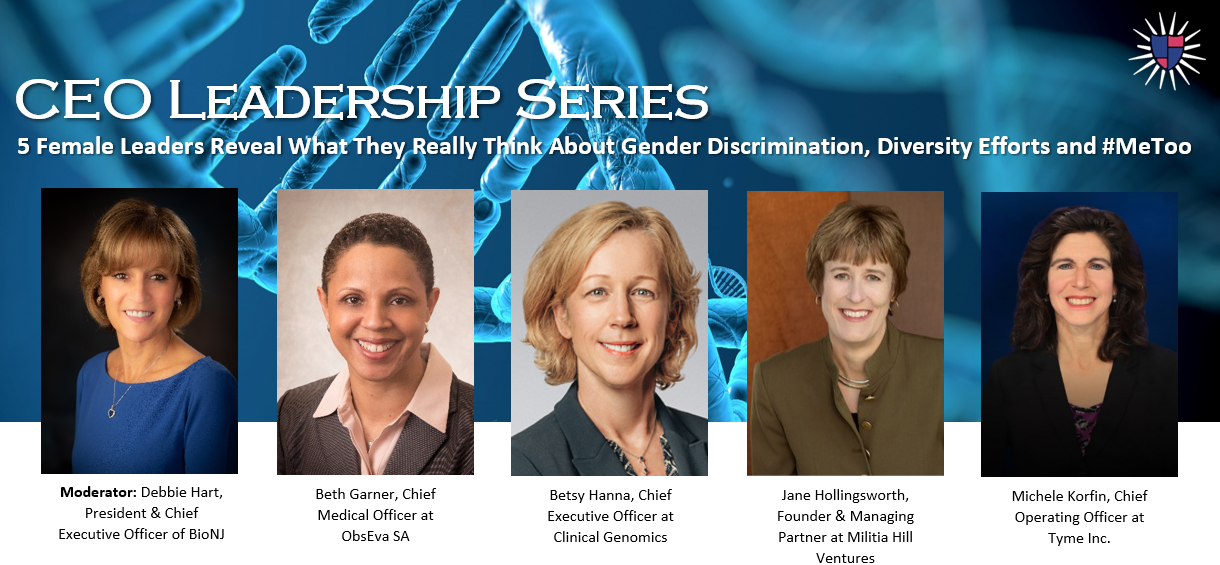CEO Leadership Series: 5 Female Leaders Reveal What They Really Think About Gender Discrimination, Diversity Efforts and #MeToo—Part 2


Ashton Tweed recently hosted a panel of women in leadership positions in the region’s life sciences industry to discuss the wide range of issues female leaders and aspiring leaders face in the workplace on a regular basis.
Moderated by Debbie Hart, the founding President and CEO of BioNJ, the panel included: Elizabeth (Beth) Garner, Chief Medical Officer at ObsEva SA; Elizabeth (Betsy) Hanna, Chief Executive Officer at Clinical Genomics; Jane H. Hollingsworth, Founder and Managing Partner at Militia Hill Ventures; and Michele Korfin, Chief Operating Officer at Tyme Technologies.
In Part 2 of the series, the panelists discuss how they actually feel about #MeToo, which anti-gender bias initiatives have been the most helpful, and how male colleagues can help women succeed.
Debbie Hart
Let’s talk about #MeToo. Are we doing a better job, or are there things people need to learn?
Jane Hollingsworth
That’s a complicated one.
Debbie Hart
For sure. … It’s interesting that there’s hesitation here.
Betsy Hanna
I’m torn by it. I see real issues, and we try to have a lot of conversation about what’s appropriate behavior and whether people are aware of their behaviors. But I think it’s become an excuse that has nothing to do with actual discrimination or harassment or sexual assault. And I think it’s become so overblown, it’s doing more damage than good.
Michele Korfin
I agree with you completely. We need to ensure we have a work environment that is positive for professional relationships.
Jane Hollingsworth
If you get it in your head that everything is bad or has bad intent, it’s not a healthy way of looking at the world, because men and women are different and they’re always going to be different, and they think differently. That’s kind of the beauty of it in many respects.
You need to think about what somebody growing up now is learning versus what somebody at age 70 learned. Having a little bit of that perspective is important. That doesn’t mean anyone should be attacking women, but just understand that everybody has grown up with different norms and you have to value and appreciate that, and not get bent out of shape easily, because it really hurts you as well as the organization. We need to find balance in the next few years in how to handle these things.
Debbie Hart
Are women still expected to bear more of the responsibility for family care?
Michele Korfin
Yes, that’s still a challenge. Jane brought up a good point—that some of it is what people have been used to. At one of the companies I worked at, the wives of most of the men I worked with did not work outside of the home. So when I traveled, the men would ask who was taking care of the children. And I would say, “My incredibly capable husband is.”
These men had been in their careers for 25 or 30 years, and when they traveled their wives took care of the children. So I viewed that as an educational opportunity.
I also think it’s very important to be very transparent when you’re entering a new role or a different stage of life—male or female. It’s important just to say that you may need to be spending some time outside of the office and not hide it.
Jane Hollingsworth
I agree. I often wondered when my first kid got braces: How do people have jobs and have a child with braces?
Betsy Hanna
I see successful people set their own boundaries. I think it’s a myth that very successful people work all the time.
Again, it’s back to choices and consequences. If you have a mindset that you have to take everything on, you actually are not as effective as a leader, because making choices means being clear about what matters most. To be successful, you have to learn that.
So how do we help? Do we set an expectation of women juggling all these different things versus women being able to focus and set their boundaries appropriately?
There’s a young woman that I worked with who’s the perfect example. She’s super-smart and a mom of two young boys. I saw her driving herself completely insane with the expectation that she has to be perfect at work and perfect at home. She’s got to have dinner ready every night and has to be the parent who makes all the cupcakes.
I’m not criticizing, but I hope she will learn that we bring this upon ourselves.
Jane Hollingsworth
Each and every one of us has to figure it out for ourselves, because you can’t do everything unless you want to drive yourself out of your mind.
What are we willing to give up? Where are you willing to lower your standards? I had to convince myself that my children will be much better off because they’ll be much more independent. But I know there’s no right or wrong.
Betsy Hanna
Growing up, I developed a mindset of off-loading everything I possibly can. My mom worked, and I know I was better off as a kid going to college who knew how to do my own laundry.
I had a conversation with our corporate attorney this morning while sitting in my kitchen and doing a whole stack of stuff. She’s a mom who had her second child while we were negotiating a huge agreement, and she literally called me from the hospital in labor.
She said to me this morning that she couldn’t keep taking this all on; she had to get house cleaning help every week. She asked me, “Should I do that?” And I said yes, and when the house cleaner shows up, figure out how many other things he or she can do for you each week!
Jane Hollingsworth
Men don’t worry about driving themselves crazy the same way.
Betsy Hanna
They focus on the three or four things that really matter and move it along, and they don’t worry about the rest of it.
Debbie Hart
Have any of you benefited from initiatives aimed at reducing gender bias during your career? Here are some examples:
• Anti-bias or discrimination policies
• Leadership development programs
• Manager training on inclusiveness and unconscious bias
• Networking opportunities for women across the organization
• Mentorship programs
• 360-degree performance reviews
• Diverse hiring committees
• Requiring a diverse slate of candidates for senior positions
• Blind resume reviews
• Coaching
Beth Garner
I’ve benefited hugely from a number of these events. I participated in a couple of leadership development programs at Merck that focused on women, and that’s where I think I first started to hear about things like networking.
Most recently, I’ve benefited from the California mandate on having women on boards. Companies in California are desperately looking for women to join their boards now.
Michele Korfin
For me, it’s networking and mentorship. I was honored that my company nominated me as the Healthcare Businesswomen’s Association rising star. I was nominated just as I was departing for maternity leave with my first daughter. Having that nomination led me to believe that things didn’t have to change for my career, unless I wanted them to, just because I was entering a new stage in my family life. Having the ability to network with other women and see the different changes in their life and that they still continued with their career helped me tremendously.
Beth Garner
Initiatives to reduce gender bias should target earlier career stages, even before women are on the job, and a lot of them do. It should be about how to get things done and how to navigate and get where you want to be. There needs to be early, early intervention.
Debbie Hart
What advice would you give women who aspire to the C-suite?
Betsy Hanna
Manage people as early as you can, take responsibility for something big, and stretch yourself. Take every job possible that stretches you beyond what you think you can do.
Jane Hollingsworth
Seize opportunities. Often women shy away from an opportunity or don’t even see it.
And you know what? It’s not that hard to be good. With basic smarts and awesome ambition, you’re a go-getter. There’s nothing that’s going to hold you back long term. It’s really on you, because there’s a lot of mediocrity out there. Half of the time, the guys don’t even worry whether they have the basic smarts, because they’ve got the ambition.
Michele Korfin
It’s important to realize that you don’t have to do everything yourself. I’ve seen situations where there’s a pivotal promotion and suddenly the person feels she’s got to prove herself; she has to do everything herself.
So sometimes there’s a loss of the team aspect and the loss of the opportunity to develop others. There’s also a loss of working with your peers. Once you get promoted, you still need to surround yourself with a good team and you need to make sure that you’re utilizing your resources.
Debbie Hart
As long as we’re in “giving advice” mode, what advice would you give male executives who want to be more supportive of women?
Beth Garner
Hire women.
Jane Hollingsworth
I would say find that female board member; don’t just talk about it anymore. It’s actions for me. Be a good listener.
Betsy Hanna
Help the organization really understand and pay attention to what results women are delivering. It’s really important to tie specific accomplishments to individuals for them to succeed and get leadership opportunities.
Jane Hollingsworth
In other words, be an advocate.
Betsy Hanna
And help women understand that different organizations function in different ways; it’s a critical factor in helping women understand how to advocate for themselves as well.
I’ve never seen an organization where you can be successful entirely on your own or where you can be successful only when somebody else advocates for you.
Beth Garner
Men who want to be helpful or supportive should do their best to work on awareness and work on putting themselves into other people’s shoes, and really try to understand the other person’s position.
Debbie Hart
I moderated a fireside chat with Dr. Bill Hait at J&J recently [the Global Head of External Innovation]. And one of the things he said was that he never did evaluations without asking, “What are the three things that I can do to help you succeed?” And the best part is that he keeps their responses on his computer screen as a constant reminder to himself. He said, “It’s selfish, because if my people succeed, then I succeed.” Now there’s a man who’s gotten it.
Are there any specific areas where female life sciences executives are advancing?
Betsy Hanna
I see advances across the board. I think part of that—the sad part—is because there’s so much room for advancement across the board. I’m seeing things improving; maybe not fast enough, but I do see progress.
Jane Hollingsworth
I agree that there’s advancement, even at the board level.
Michele Korfin
What I think is great is that we’re seeing advancement at small, medium, and even large companies.
Beth Garner
I have to say I agree.
Debbie Hart
You know, I am encouraged. I think this is like anything when you’re looking for broad societal change. It just takes time.
To that end, how can we ensure that the life sciences are exciting to girls and young women?
Beth Garner
I find this question interesting because I feel the sciences ARE exciting to young girls. If you look at girls in grade school, they are often further along in some ways than boys when it comes to science and math. I also think girls have a natural curiosity, every bit as much as boys have. I think it’s in middle school and high school where you see the interest start to fall off.
Jane Hollingsworth
I think that, for whatever reason, girls start to get nervous in their teen high school years. Then it’s sort of downhill from there unless they have the good fortune of having mentors and things like that.
Michele Korfin
If you look at gender early on, the excitement for science is often higher for girls. I think what actually will keep girls’ interest in science going forward is having role models for girls as they are getting to middle school and high school, and then female role models that look like them in terms of racial and ethnic backgrounds in college.
Jane Hollingsworth
I see plenty of girls and women in the sciences in high school, college, medical school, and Ph.D. programs. The question is, what about our industry? How do we get them interested in our industry, and what’s attractive about it?
There are a billion ways to make a buck in this world, and life sciences is a really fulfilling place to be. For people who want to use their life, especially if they’re talented and well educated, to advance the world, it’s a very noble place to spend a career.
Betsy Hanna
I don’t know about the rest of you, but for me, science and math were interesting and fun because I felt I was successful at it.
So how do you create experiences that build and sustain a feeling of accomplishment and success in girls through those middle years?
Jane Hollingsworth
Let’s start with good teachers.
Betsy Hanna
Opportunities in school and encouragement to help young girls feel successful.
Debbie Hart
Do you all have any parting thoughts?
Jane Hollingsworth
I think we’re absolutely on the right track. A lot of ideas came up today that are right on the money. There’s no revolution required here, only evolution.
Michele Korfin
We’ve all shared examples of how we’ve been supported throughout our career.
Let’s continue to give back with that. Let’s support other women who have great potential that need mentorship, but even more than mentorship, sponsorship in order to really advocate for them. Let’s also take the opportunity to support other groups that may be in the minority. It’s going to be important to continue to support a diverse workforce in the life sciences.
We’ve brought up consistently the advice to put yourself out there, speak up, and learn to influence.
Beth Garner
Leadership is also about teaching women to believe in themselves.
Debbie Hart
A friend said something to me when we were in our 20s that was so inspiring to me, and I’ve shared it with so many people because it was so well said: “Feel the fear and do it anyway.”
And speaking of well said, all of you said so many enlightened things here. Thank you so much for sharing your words of wisdom.
Ashton Tweed would like to thank each of the participants in this interview. If your company needs help from members of the Ashton Tweed Life Sciences Executive Talent Bank, we can supply that assistance either on an interim or a permanent basis. Additionally, if you are among the many life sciences professionals affected by the changes in the industry, Ashton Tweed can help you find the right placement opportunity — from product discovery through commercialization at leading life sciences companies — including interim executive positions and full-time placements. In either case, please email Ashton Tweed or call us at 610-725-0290. Ashton Tweed is pleased to continue to present insightful articles of interest to the industry.





